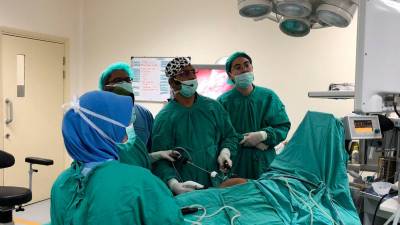PETALING JAYA: Malaysia should press Singapore to reimburse the government for the millions of ringgit spent subsidising the training of doctors and nurses who later leave for higher salaries across the Causeway, said former minister Datuk Seri Abdul Rahman Dahlan.
He proposed that Singapore, via a government-to-government arrangement, pay Malaysia the full subsidies incurred in training the medical professionals it recruits.
“Alternatively, if Singapore prefers not to make a one-off compensation, the Malaysian government could impose an additional levy, calculated monthly or yearly and based on the contracts and income earned in Singapore,” he said in a statement.
Abdul Rahman stressed that the levy or compensation must come from Singaporean employers.
“This shouldn’t be seen as punishment on those who seek employment abroad, but as a compensatory mechanism after having been trained locally at the expense of taxpayers.”
Universiti Kebangsaan Malaysia health economics and public health specialist Dr Sharifa Ezat Wan Puteh told a Chinese daily that the government spends an estimated RM500,000 to RM1 million to train each medical student over five years.
Calling his proposal a “win-win situation”, Abdul Rahman admitted there would be technical and legal hurdles but said further studies were needed to refine the mechanism.
He warned that Malaysia’s long-standing “brain drain” of medical professionals has reached crisis levels due to aggressive overseas recruitment.
His remarks follow walk-in interviews by Singapore hospitals in Kuala Lumpur, part of what he described as blatant recruitment drives.
In July, Singapore’s Health Ministry held interviews in KL, offering doctors annual packages worth S$110,000 (RM385,000).
This excludes accommodation allowances, insurance, relocation support, overtime bonuses, flight tickets and other perks.
Abdul Rahman said Singapore was deliberately “flexing its financial muscles” to undermine Malaysia’s mission to provide adequate and affordable healthcare, particularly in Sabah and Sarawak.
He said domestic shortcomings, such as the unpopular contract system, low allowances and vague career pathways, have also fuelled the exodus.
However, he said “no member country should be allowed to take advantage of other member countries in an unfair manner, especially on issues crucial and critical to the lives and medical welfare of their citizens”.
On Aug 7, theSun reported that 705 doctors and 1,394 nurses with more than five years’ service resigned between 2022 and 2024.
Specialist resignations have also surged, with 917 leaving between 2019 and 2023, including 359 in 2023 alone, particularly in paediatrics, internal medicine, anaesthesiology and orthopaedics.
